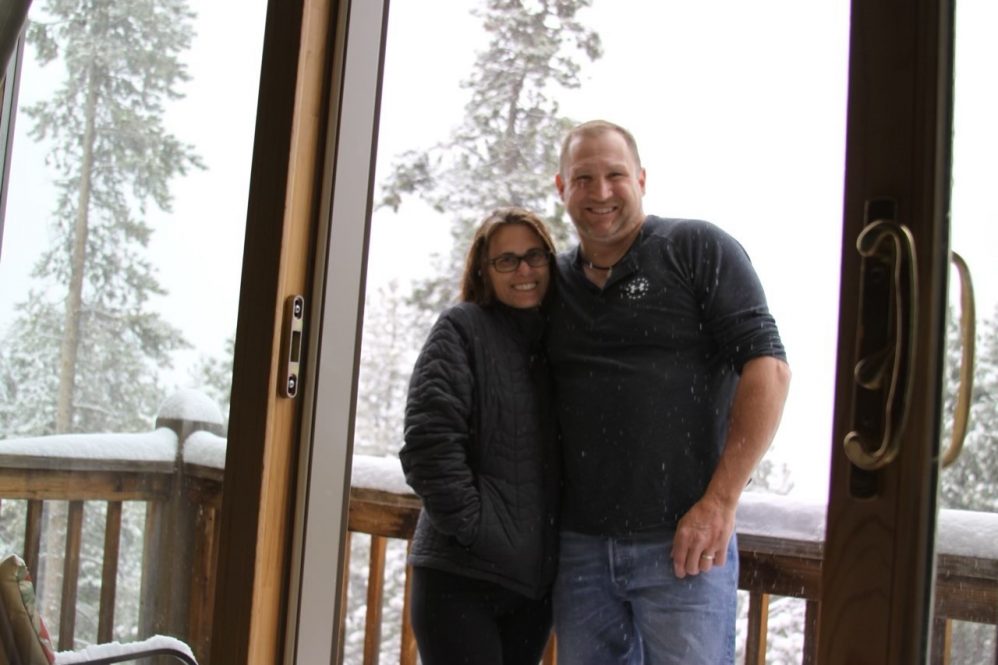
Kirk Valencis, 57, of Bristol stays physically active and is in good shape. He also has a favorite hobby: “My thing is helping people.”
This fall, UConn Health’s Pat and Jim Calhoun Cardiology Center was standing by to return the favor and help Valencis when he suffered a major heart attack.
“Everything aligned for me to survive my heart attack,” says Valencis, including paramedics rapidly responding to his home, and later UConn Health multidisciplinary team members from across the Emergency Department, cardiology, interventional cardiology, cardiothoracic surgery, nursing, the intensive care unit, and even the additional power of two different-sized mechanical cardiac support devices and assistance from another nearby hospital.
“I feel amazing! I am already back to walking a mile a day,” he says. “My doctors tell me it’s an absolute miracle that I’m here. I wasn’t expecting to have a massive heart attack. I am truly blessed.”
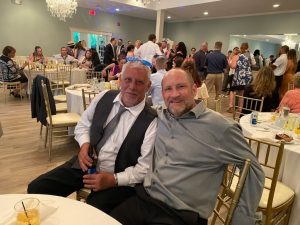
Valencis has always maintained a healthy weight, could hike for miles, regularly donates blood platelets, and even volunteers on a farm bailing hay or planting Christmas trees. But recently he was having heart health warning signs like shortness of breath when laying down, which he thought might be sleep apnea or just that he was getting more tired as he aged. He never thought he’d ever have a heart attack.
“It’s just crazy what happened to me,” Valencis says. He credits his good friend Bob Prims, who had a mild heart attack years before, with beginning a cascade of events that helped save his life one day when he started experiencing heart attack symptoms.
“Kirk felt nauseous and just didn’t feel good,” his wife, Dawn Valencis, recalls, remembering how Prims drove Valencis home from helping a family member on September 20.
“My friend saved my life that day!,” Kirk says. “He stuck around for a while to make sure I was okay after not feeling well, and as I started to experience pain in my left arm. My friend even grabbed me some aspirin, called the ambulance, and told me I had to go to the hospital.”
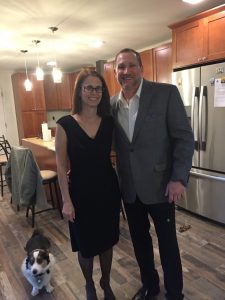
When paramedics arrived at Valencis’ home, they performed an EKG confirming that he was having a dangerous, life-threatening heart attack caused by severe artery blockages known as a ST-Elevated Myocardial Infarction (STEMI).
The paramedics knew they needed to take him to UConn Health for specialized heart care. They called ahead with a STEMI ALERT to the UConn John Dempsey Hospital’s Emergency Department to activate the Cardiac Catheterization Laboratory so that heart attack experts there could quickly open the dangerously blocked arteries to restore blood flow to Valencis’ heart for a chance at survival.
But while in the Cath Lab with Dr. JuYong Lee, interventional cardiologist and director of vascular and endovascular medicine at UConn Health, it was discovered that this heart attack was an unusually massive one.
It was being caused by a total occlusion of the left main artery with a large clot blocking blood flow. This was in addition to his several other blocked arteries needing to be urgently opened. While a special Penumbra mechanical thrombectomy procedure was underway to remove the clot blocking blood flow in the heart’s main artery, his heart went into cardiac arrest and stopped several times, and defibrillation and CPR needed to be administered.
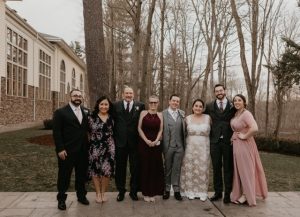
“UConn Health was incredible. I died a few times on the table and they were able to bring me back a few times,” Valencis says. “If those paramedics didn’t bring me to UConn, I don’t think I would be here today, or for Christmas, and I definitely wouldn’t be here if it wasn’t for the doctors at UConn Health.”
“It was a very bad situation,” says Dawn. “His whole left side of his heart was shut down, and stopped working, and his heart was only functioning 10 percent. We kept vigil. We didn’t think he was going to make it and prepared for the worst.”
“Every artery in his heart was closed up and his left main coronary artery was completely blocked off from blood flow. His heart was hardly moving or contracting,” recalls Dr. Chittoor B. Sai Sudhakar, chief of cardiothoracic surgery at UConn Health.
“This patient’s serious heart condition usually causes immediate death when the left main artery suddenly closes,” says Lee. “It’s a miracle that he made it to us by ambulance in time.”
Sai Sudhakar, his heart surgeon, adds: “We had to do CPR and shock his heart a few times in the Cath Lab. After restoration of blood flow to his heart muscle from mechanical thrombectomy and angioplasty, then a small, minimally invasive IMPELLA CP mechanical support device was placed by Dr. Lee. We then had to rush him to the operating room for lifesaving coronary artery bypass surgery to open the remaining heart artery blockages.”
The smaller lifesaving mechanical circulation cardiac support device was exchanged for a large IMPELLA 5.5 device surgically placed during the CABG which continued to help his weakened heart muscle pump blood until his heart function could possibly recover.
“This was the first time that the large size IMPELLA 5.5 device was used here at UConn John Dempsey Hospital,” says Sai Sudhakar. “The device helped keep his weakened heart pumping and circulating blood to the rest of his body to stabilize his health and give him a shot at survival.”
After his initial week of care at UConn in the intensive care unit, Valencis was transferred to Hartford Hospital, where they were able to take the cardiac support device out. His UConn care team would go over to Hartford Hospital to visit him during his additional three week stay there.
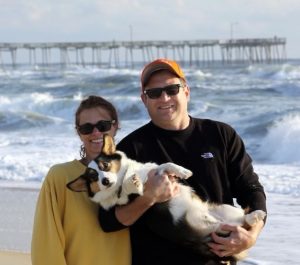
“His heart is now fine!” says Sudhakar.
“His heart function has been mostly regained without sustaining permanent damage to heart muscle,” says Lee.
“The device was removed – and Kirk was fine. He walked out of the ICU!” exclaims Dawn. He was discharged home on October 22. “We are all amazed by this! Even Dr. Sai and Dr. Lee both think it’s a miracle.”
“You can’t put a price on this. It feels good to be able to save a young man’s life,” adds Sai Sudhakar. “Men and women of all ages need to rush to the emergency department if they think they are having heart attack warning signs, especially any chest pain or arm pain.”
Valencis’ message to others: “If you ever have to go to any hospital, go to UConn! It was absolutely amazing. I can’t say enough about the staff at UConn Health. I am extremely grateful!”
“The nurses at UConn are great,” Dawn adds.
Valencis was particularly impressed by UConn Health’s teaching hospital and the “entourage” of doctors, nurses, residents, and students working together to look over his health once he woke up from his sedative coma.
“I now am looking forward to Christmas, but not only Christmas, I look forward to every day now,” Kirk says.
“We are so thankful for the help for Kirk. Without UConn Health and its doctors, this Christmas could have been a whole different holiday for our family. We love them! These doctors are unbelievably caring, empathetic and experienced,” says Dawn.
And UConn Health doctors say it’s all about teamwork.
“Only with a strong system in place is this lifesaving care and outcome possible,” Sudhakar says. “When it comes to heart attack care, we always need to be on our game 24/7 – and this patient’s story shows just what we do here at UConn Health together as a team.”
Lee adds: “This is a strong example of the multi-department teamwork that happens here at UConn Health across EMT, ED, cardiology, interventional cardiology, cardiac surgery, and the ICU.”
“Kirk now feels like a million dollars,” says wife Dawn. “He has a heart of gold. His survival story really is a Christmas miracle. The paramedics decided he needed to go to UConn Health. Thank God, since UConn did everything for him and kept him alive.”
The happy couple now looks forward to spending this special Christmas together with their children. Also, Valencis’ looks forward to continuing to care for his mother-in-law daily who battles dementia.
They also want everyone to remember to look after their heart health.
“It’s not just aging,” Kirk says. “Listen to your heart and your gut and keep advocating for yourself when you notice a change in your heart health or any potential heart attack warning signs.”
A very Merry Christmas to this heart attack survivor and his family.
To make a holiday donation gift to support the work of the Pat and Jim Calhoun Cardiology Center at UConn Health visit the UConn Foundation website.
